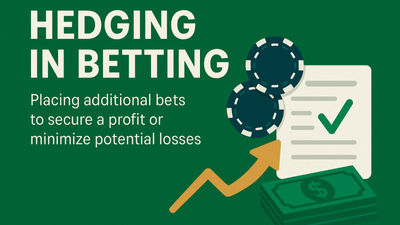Sports betting is not just about picking winners; it is also about managing your money well. Understanding your bankroll is crucial for every bettor. Whether you bet casually or aim to be a professional, managing your bankroll effectively can be the key to long-term success and help you avoid going broke.
What is a Bankroll in Sports Betting?
In the simplest terms, a bankroll is the total amount of money you’ve set aside exclusively for betting. This isn’t your grocery budget or rent money — it’s a separate fund that you’re willing (and able) to lose without affecting your financial well-being.
Think of it as your “business capital” for betting. Every wager you place is a business decision, and your bankroll is your investment pool.
Why is Bankroll Management Important?
Without proper bankroll management, even the most professional sports bettors can quickly find themselves in financial trouble. Here's why managing your bankroll is crucial:
Avoids Emotional Betting: Managing your bankroll with discipline prevents rash decisions after a win or loss.
Limits Losses: It protects you from wiping out your funds with just a few bad bets.
Maximizes Longevity: Good bankroll management allows you to stay in the game longer and learn from your experiences.
Enables Strategy: A structured bankroll lets you develop and refine your betting strategy over time.
How to Manage Your Bankroll in Sports Betting
Here are the fundamental steps to managing your bankroll effectively:
1. Set Your Bankroll Amount
Decide how much money you can set aside just for betting. This amount should be something you can afford to lose without affecting your daily life. For beginners, this might be a few hundred rupees or dollars. For more experienced bettors, it could be a larger amount.
2. Define Your Unit Size
A unit is a set percentage of your total budget that you use for each bet. Responsible bettors usually suggest betting between 1% and 5% of your budget per bet. For example, if your budget is ₹10,000 and your unit size is 2%, then you would place each bet for ₹200.
3. Be Consistent with Your Bets
Don’t bet more than your usual amount based on a feeling or a winning streak. Follow your plan and only change it if your bankroll goes up or down a lot.
4. Track Every Bet
Keep a detailed record of every bet you place — including the amount, type of bet, odds, result, and profit/loss. This helps you understand what’s working and where you need to improve.
5. Adjust Based on Results
If your bankroll grows or shrinks by a significant margin (say 20-30%), you may need to recalculate your unit size. This keeps your bets proportional and minimizes risk.
6. Avoid Chasing Losses
One of the biggest mistakes bettors make is chasing losses by placing bigger bets to recover. This almost always leads to larger losses. Stay calm, stick to your unit size, and trust your strategy.
7. Have a Stop-Loss Limit
Set a maximum loss limit for a day, week, or month. If you hit that limit, take a break. This ensures emotions don’t drive your decisions and helps preserve your bankroll.
Advanced Bankroll Strategies
For those with more experience, here are a few popular bankroll management systems:
Flat Betting: Betting the same amount on every game (e.g., 1 unit).
Kelly Criterion: A formula that adjusts your stake based on perceived edge and odds — more complex, but maximizes long-term growth.
Percentage Betting: Betting a fixed percentage of your current bankroll, so your stake changes as your bankroll changes.
Managing your bankroll is just as important as analyzing teams and odds. Even the best predictions won't help you without discipline and a clear money management plan. Treat sports betting like a long-term investment, not a way to get rich quickly.
Start small, stay consistent, and over time, you’ll see that good bankroll management is the key to every successful bettor’s journey.
















